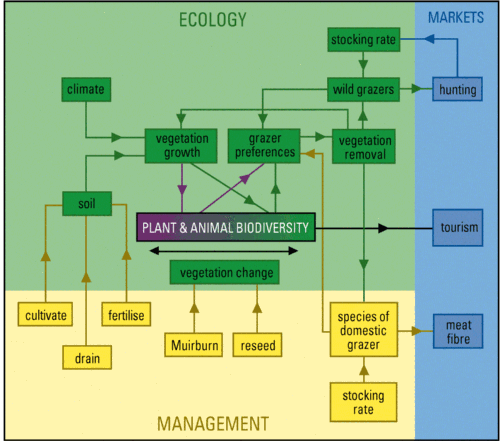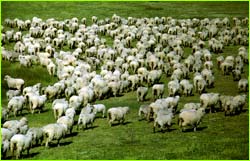Long-Term
Implications 2
The Scenario:
The effect of Foot and Mouth on upland farming throughout the U.K would
be to reduce the number of farms in these areas - what effect would this
have on the wild land in upland areas?
Pre
Foot & Mouth - Intensive farming
-
CAP - livestock premia, Hill
Livestock Compensatory Allowance - encouraged intensification of farming.
-
Overgrazing & wildlife
problems
The
need for grazing management
-
Management
of upland vegetation by grazing management is important as it aims
to protect and enhance the diversity of various species.

-
Flow chart illustrates the
importance of grazing to plant and animal biodiversity (wilderness). [Grazer
= vegetation removal = plant & animal biodiversity].
-
The extent/management of grazing
will determine the loss/gain of biodiversity.
-
The long-term effects of foot
and mouth depends on the future of farming - grazing management
is recognized as a technique at the heart of conservation of wilderness
within farming.
Post
Foot & Mouth - Extensive Farming
-
Intensive
farming in upland areas does not help to preserve wilderness.
-
After
the Foot & Mouth crisis, many farmers abandon farms (financial pressure)
thus there are less farmers per unit area - more 'extensive' farming
practices.


INTENSIVE
FARMING..........................................................................EXTENSIVE
FARMING
-
Extensive farming in the upland
areas of the U.K refers to the more spatious grazing of livestock over
a larger area.
-
Extensive farming is a method
of reducing and controlling grazing as part of grazing management and will
in turn assist the development and conservation of the wilderness.
-
Crofting is a technique (extensive)
used that involves a small enclosed area with an extensive area of pasture
for grazing.
"there is a need to encourage
extensive rather than intensive
agriculture....." (to protect wilderness)
(Good, C. 2000)
Extensive
Farming and Wilderness in upland areas
-
When
the economics of farming are marginal (upland farming) there is a chance
to work towards a change in favour of conservation and re-wilding.
-
Extensive
(low-intensity) farming may be one answer.
-
After
the Foot & Mouth epidemic, the possibility of using more extensive
farming techniques if probable.
-
The effect
that this has on the wild lands (wilderness) of the upland areas in the
U.K seems favourable with extensive farming encompassing grazing management
which in turn can help the conservation and regeneration of wilderness.
Back
to Contents




